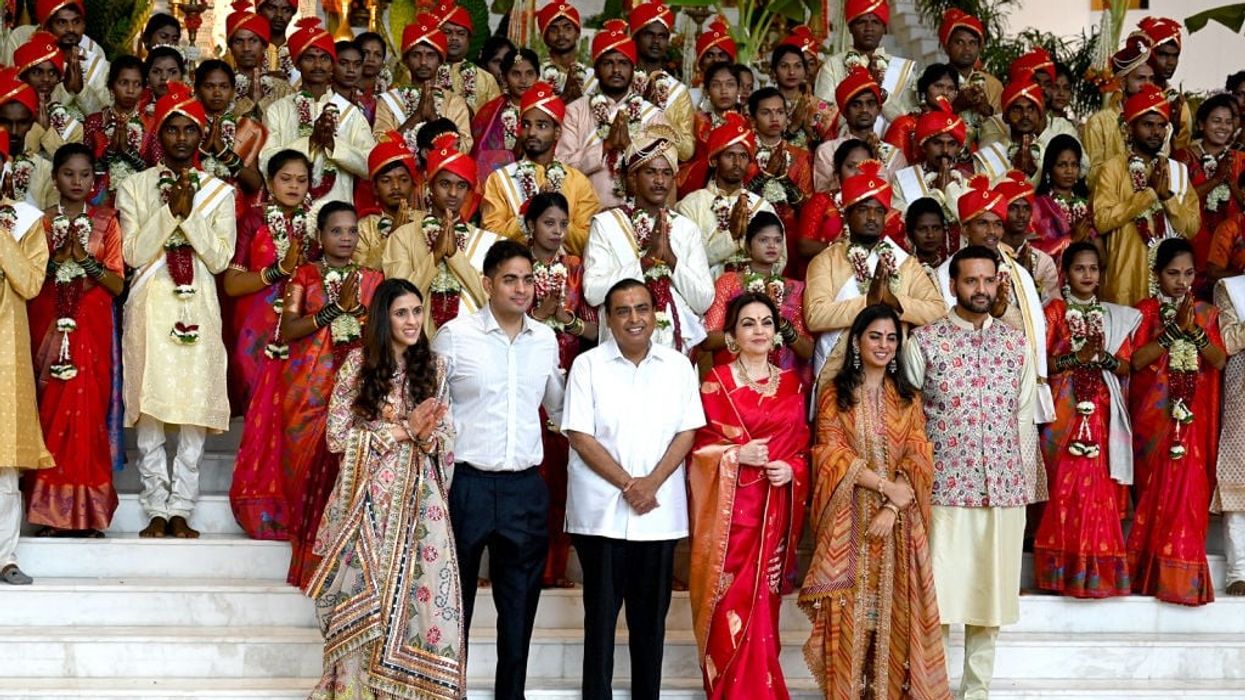ASIA'S richest man, billionaire Indian tycoon Mukesh Ambani, launched Tuesday the start of the lavish finale of his son's wedding celebrations with mass nuptials for 52 "underprivileged" couples.
Pre-wedding parties for his son have already included multi-day galas, a European cruise for 1,200 guests, a specially-built Hindu temple, and entertainment provided by performers ranging from R&B star Rihanna to the Backstreet Boys.
Ambani, 67, is chairman of Reliance Industries - India's biggest company by market capitalisation - and took part with his family in Tuesday's Hindu ceremony with some 800 guests.
"Starting with this function, the family pledged to continue supporting hundreds more such weddings across the country," his company said in a statement.
Ambani's younger son Anant and fiancee Radhika Merchant, both 29, are set to marry in a three-day Hindu ceremony in India's financial capital Mumbai from July 12.
The billionaire father is no stranger to throwing a costly wedding.
Ambani held the most expensive wedding in India to date for his daughter in 2018, which reportedly cost $100 million (£79m) and saw US singer Beyonce perform.
India is the fastest-growing major economy, but the world's most populous country has a jobs crisis to match.
National per capita income is just $1,174 (£926.9), according to government data.
Many couples face intense social pressure to throw a costly wedding, sometimes pushing them into crippling debt.
India was ranked 111 of 125 countries in the Global Hunger Index report last year, a peer-reviewed measure calculated by European aid agencies.
'Beginning of the festivities'
Ambani, for his son, has already thrown two extraordinary parties ahead of the main celebrations later this month.
That included a three-day gala in February for 1,500-plus guests in Gujarat state.
At that party, Rihanna performed her first concert since last year's Superbowl to guests including Facebook founder Mark Zuckerberg, and ex-US president Donald Trump's daughter Ivanka.
A second leg in June was a four-day Mediterranean cruise, where singer Katy Perry performed at a masquerade ball at a French chateau in Cannes.
The Backstreet Boys, US rapper Pitbull and Italian tenor Andrea Bocelli also provided entertainment.
At the wedding ceremony on Tuesday, at a Reliance office park in the city of Navi Mumbai, each couple was given gold and silver wedding jewellery, $1,200 (£947) in cash and groceries "sufficient for one year", the company said.
"Today marks the beginning of the festivities for our children Anant and Radhika's wedding," Nita Ambani, the billionaire's wife, told reporters at the wedding venue.
"As a mother, it fills me with happiness to witness the marriages here today... I pray to God for their happiness and well-being throughout their lives."
The company said the mass wedding highlighted the Ambani family's "commitment to social welfare and community support". (AFP)




